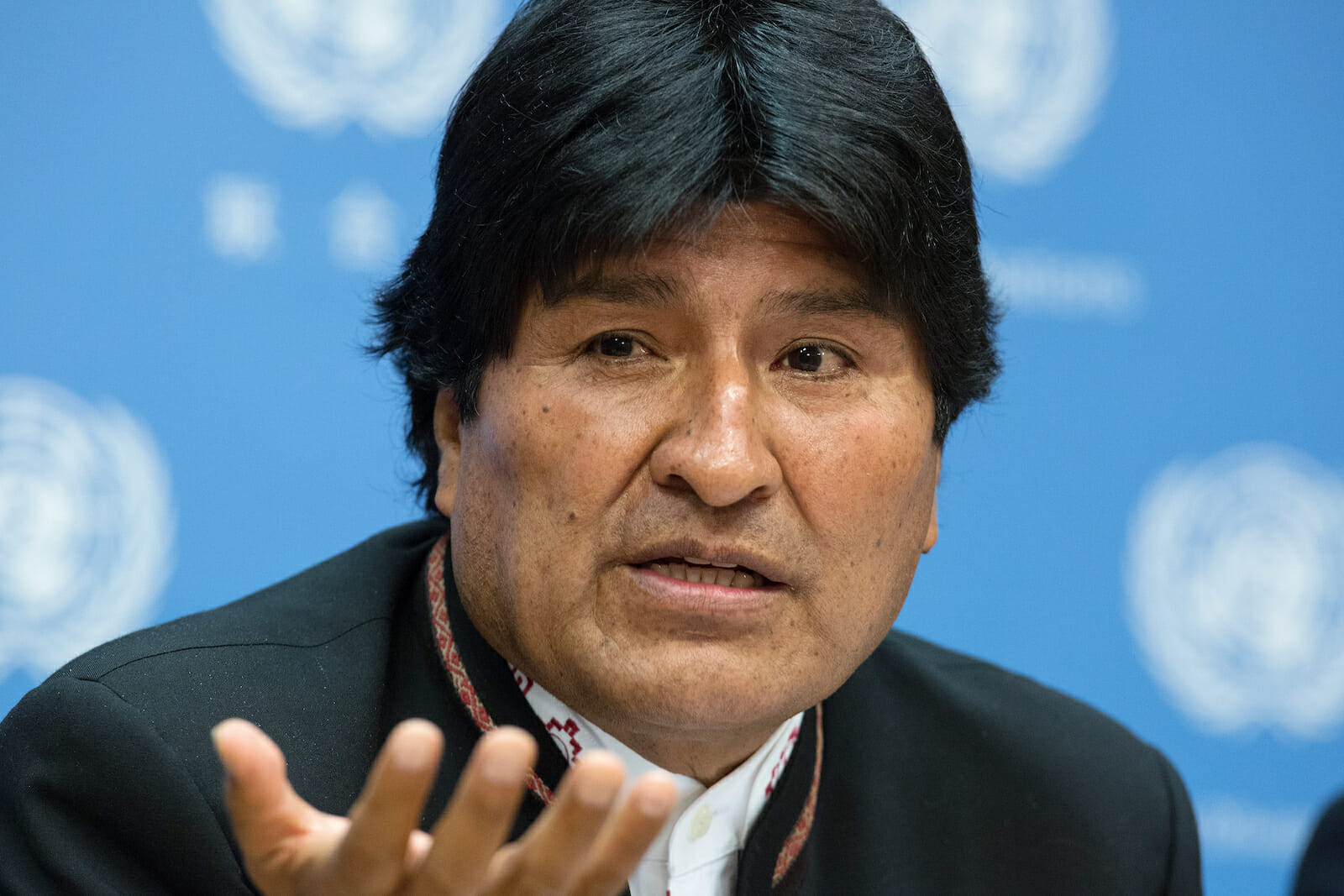
Losing Bolivia: Evo Morales’ Failing Presidency
“[The Bolivian government] will seize more oil companies if they fail to meet investment commitments.” – President Evo Morales
For the sixth time in as many years, Bolivia is poised to nationalize more of its natural resource-based industries; a primary focus of the Morales administration since coming to power in 2006. For five years, the government – to the citizenry’s fanfare – has taken control of much of the country’s oil, gas, and mining industries; a transition justified by the government in that these sectors are integral for the nation’s survival.
Behind the most recent push for nationalization is the government’s perception that foreign corporations are “sabotaging investment,” which is stymieing the country’s ability to “increase production.” The rationale, however, has fallen on deaf ears. With plummeting poll numbers, the Morales administration has struggled to save face with the population. Growing disquiet throughout the country threatens to undermine the government’s ability to implement policies and programs and will possibly leave President Morales vulnerable in his attempt at a third term.
Bolivia in Turmoil
Open demonstrations against the government began in February 2011 as the administration attempted to end fuel subsidies for the entire nation – sky-rocketing prices by 70%. The government backed down shortly after the unrest began, but the damage was already done; wavering on subsidies created uncertainty in the transportation and agriculture sectors, which, for the past year, have kept prices high and further fuelled discontent.
By mid-October, President Morales’ approval rating was slashed in half-hovering around 30%. The groups that had been hit the hardest with the sharp increases were the administration’s own supporters. The growing issues with the political base reached a fever-pitch when President Morales initiated the construction of a highway that was intended to connect the isolated, rural communities with larger cities. The highway’s development, which was planned to cut through several national parks and the TIPNIS Indian reservation, was met with opposition from the Amerindian people, NGOs, union leaders, and left-wing politicians and activists.
President Morales defended the project as being vital to national development; opponents believe the project will not only create environmental damage but also allow for the expansion of cocoa growing. For the indigenous population, the highway was a violation of the 2009 Constitution in that the project was green-lit before they were notified or consulted on the project’s scope.
The government’s attempt to remove subsidies and its desire to develop the highway project, in order to expand the country’s natural resource production, is indicative of Bolivia’s current financial state. La Paz’s limited domestic development was severely undermined by the economic collapse, and the continued yearly increase in taxes on oil and gas production has been unable to fill the gap between the state’s income and spending. The people are in need of the social safety nets to compensate for the high unemployment and rising inflation; aspects of the community they have grown to expect but the state is struggling to deliver.
Overcoming Regional Barriers
For decades, Latin American countries suffered from massive underdevelopment and lacked basic necessities, such as expansive public health sectors, infrastructure modernization, economic and political stability, or universal access to food and water. This not only hindered local economic growth but also failed to create an attractive environment for trade and foreign investment. Industrial sectors suffered from inefficiencies throughout the region and production was undermined by a vibrant informal economy. Victor Lledo, Aaron Schneider and Mick Moor – in Governance, Taxes, and Tax Reform in Latin America – illustrated how the toxic regional environment hindered the development of strong national leaders, which led to the manifestation of inefficient tax codes, failing infrastructure, and protectionist policies that defined Latin America for decades.
After nearly 200 years since Latin America gained its independence from colonialism, the region continues to struggle with development. To some degree, the fault remains firmly in the hands of foreign interference, but this is not a burden suffered solely by Latin America so it cannot be primary reasoning for regional failures. For many Latin American countries, the people’s continued glorification of their past makes it near impossible to move forward with policies to modernize infrastructure and strengthen society. Moreover, questioning political leadership – coupled, strangely, with an affinity to pseudo-authoritarianism – furthers the region’s inability to initiate effective development programs.
The central issue with many in the region is that they rely on blaming exterior forces for all their ills and refuse to acknowledge how the region has failed itself.
Struggling with Nationalization
Since his election in 2006, Evo Morales has become the most successful modern Latin American leader. The administration’s focus on redirecting funds, acquired from raising taxes on foreign corporations, to develop the poor and rural areas of the country afforded President Morales an easy victory, for a second term, in 2009. Problems emerged in 2010 when the government proceeded with a plan to nationalize large sections of the country’s electric industries, which increased costs in other areas of the economy and lead to anti-government protests, the first under President Morales.
Nationalization became a primary issue for the Morales administration because prior presidents had weakened national laws set in place to defend the state and domestic companies from corruption and bribery. Consolidating national assets under government control was a way for the current administration to protect what little the country had to raise capital, even though, similar to the other nationalized industries, the companies were in disarray and no one believed they would succeed independently let alone under government control.
Two problems stemmed from the country’s industrial nationalization: First, Bolivia’s government pressed ahead with the process in a weakened industry without allocating funding for infrastructure modernization or establishing the proper institutions needed to govern its activities. Second, Bolivia’s primary interest in preserving its factor-driven economy has created a narrow-minded economic policy, in which the government is continuing to perpetuate the nation’s over-reliance on export capital rather than investing in the country’s production and industrial sectors that would allow the domestic market to expand.
‘Traitors are Never Scarce’
Corruption played an important role in Bolivia’s movement toward nationalizing domestic industries; however, even with the truest intentions, the Morales administration suffered a severe setback, last December, when leaders of the state-run oil company were sentenced to 12 years in prison for bribery and influence-peddling. This situation has only compounded distrust in the state and furthered the opposition’s perception that the government is undermining the 2009 Constitution and being lackadaisical about its efforts to combat corruption.
As the uprisings continue to spread throughout La Paz, the Morales administration has resorted to referring to the protestors as criminals. Last fall during a march on the capital, opposition protestors were met with violence by the country’s security forces. When the images were splashed all over the media, many senior officials – including the defense and interior ministers – resigned in protest and many supporters of the Morales administration sided with the President’s political rival. When this occurred, President Morales stated: “Traitors are never scarce…I don’t understand how some of our leaders can sign agreements with representatives of big landowners with the oppressors of the past.”
When attacking the validity of the protestor’s claims failed to achieve the desired ends, the government reached back to rhetoric used by past leaders and “accuse[d] the United States of spying on [the Bolivian] and other Latin American countries” through “USAID and other…NGOs.” Blaming primarily America’s Conservative leaders, La Paz has blamed Washington of undermining the nation’s democratically elected government.
The Failing Presidency
President Morales is clinging to his Presidency and even with all the calls for his resignation, it seems he may hold on to power. With the infighting occurring in the rival parties, Evo Morales may win a third-term by default. His campaign to rebuild Bolivia into the country it ought to be has fallen short.
Strong central institutions and well-structured government policies can and do positively impact national advancement by subsidizing social and infrastructure programs, in thus instituting nationalization policies in a nation that has struggled for decades with development is not a counter-productive policy. Moreover, the region’s ability to focus investments – after the regional collapse between 1998 and 2002 – on modernizing infrastructure, reforming national institutions, and advancing human capital has strengthened Latin America’s current standing in the international community. These advancements were not universal and some countries were slow to advance.
Bolivia attempted to construct its own path to achieve political and economic stability, but it has spent too much of its energy developing natural resource-based industries – rather than production and industrial sectors – and too many resources enticing foreign investments. Successful countries in the region focused their attention on strengthening domestic economic progress and reinforcing social safety nets; since 2010, President Morales’ administration has been unwilling to acknowledge the people’s grievances or compromise to find solutions to growing issues.
Though it is an effort to the democratic model Bolivians have been struggling to achieve for generations, the protests are weakening President Morales grip on power. President Morales’ is quickly losing creditability at home and throughout the region. His administration needs to clean up the corruption and correct its inefficiencies in order to rebuild trust with the population if it is not too late already.

